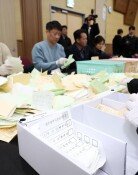The World Has Entered Into a Green War
The World Has Entered Into a Green War
Posted February. 14, 2005 22:29,
The Kyoto Protocol, in which countries agreed to limit their greenhouse gas emissions, including carbon dioxide, enters into force on February 16.
With the effectuation of the Kyoto Agreement, environmental regulations surrounding the emission of greenhouse gases are likely to emerge as a new barrier in international trade, which is raising concerns about countermeasures of the Korean government.
According to the government and industrial circles, on February 14, with the effectuation of the Kyoto Protocol ratified by 141 countries from February 16, Korea will come under increasing pressure to cut its greenhouse gas emissions directly or indirectly.
With the enforcement of the Kyoto Protocol, the 39 developed nations, including European Union (EU) member countries, have to cut their greenhouse gas emissions between 2008 and 2012 to levels that are 5.2 per cent below 1990 levels.
Although Korea ratified the Protocol in November 2002, it is not among the countries that have to reduce their emissions of greenhouse gases starting from 2008.
Nonetheless, there is a high possibility that Korea will be one of the countries that are committed to reducing emissions under the Kyoto Protocol from 2013 to 2017, the second commitment period.
Some experts predict that even before the second commitment period, each nation is likely to impose trade sanctions on the country that emits a large amount of greenhouse gases.
As for the matter, the minister for trade said at the briefing, As Korea is an Organization for Economic Co-operation and Development (OECD) member country and currently produces much carbon dioxide, the outside world will put more pressure on the Korean government to reduce its greenhouse gas emissions.
In particular, Korea is the ninth-largest greenhouse gas producer (as of 2001) and emits greenhouse gases double the figure for 1990, which is raising concern of the increasing pressure on the Korean government.
The Korean automotive sector has already contracted with European Commission to gradually cut the carbon dioxide emissions of the cars exported to the EU region by 2009.
A researcher of the Hyundai Research Institute, Lee Boo-hyoung, forecasted that although the Korean government and the industrial sector have embarked on arranging a special measure to reduce greenhouse gas emissions, there would be many difficulties in achieving the goal due to the heavy cost burden and the existing industrial structure.
Ki-Jeong Ko Chang-Won Kim koh@donga.com changkim@donga.com







